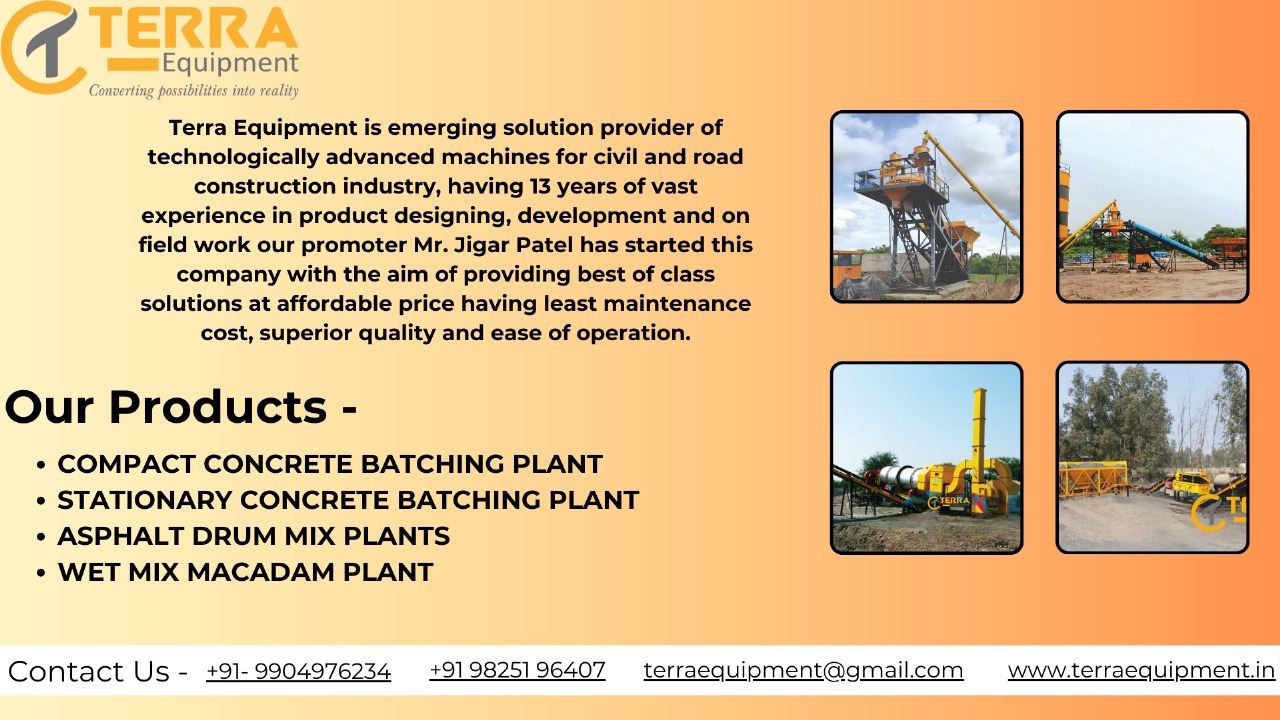Mobile Batching Plant
A Mobile Batching Plant (also called a portable concrete batching plant) is a compact, flexible, and easily transportable concrete production unit designed for on-site use. Unlike stationary plants, it does not require a permanent foundation, allowing it to be quickly assembled, disassembled, and relocated. The plant includes essential components like cement silos, aggregate bins, weighing systems, mixers, and control panels, all mounted on a wheeled chassis or skid. Mobile batching plants are widely used for short-term projects, remote sites, and fast-track construction jobs.
10
Frequently Asked Questions (FAQs)
- What
is a mobile batching plant?
It’s a portable concrete batching system that can be transported and set up easily at different job sites. - What
is the difference between stationary and mobile batching plants?
Mobile plants are compact, quick to relocate, and don't need permanent foundation work, while stationary ones are fixed for long-term use. - What
is the capacity of a mobile batching plant?
Usually between 15 to 60 m³/hour, with some models offering higher output. - Is
it suitable for ready-mix concrete production?
Yes, especially for on-site RMC production at remote or temporary locations. - How
long does it take to set up?
Most units can be installed and commissioned in 1–2 days. - What
are the power sources available?
Available in electric and diesel configurations, suitable for both urban and rural areas. - Can
it be customized?
Yes, with options like additional silos, admixture systems, and automated controls. - Is
special training required to operate it?
Basic training is enough; user-friendly control panels make operation simple. - How
is concrete transported after batching?
By transit mixers, dumper trucks, or direct discharge into a casting site. - Is
it environmentally friendly?
Many mobile plants include dust collectors, recycling options, and closed water systems for eco-friendly operation.
Applications
- Road and highway construction
- Bridge
repairs and short-span bridges
- Temporary
or remote site developments
- Residential
housing projects
- Precast
concrete manufacturing on-site
- Windmill
or solar farm foundations
- Military,
disaster relief, and emergency constructions
- Airport
runway patching and expansion
Features
with Uses
|
Feature |
Use/Function |
|
Compact & trailer-mounted frame |
|
Built-in aggregate bin & silo |
On-board storage for raw materials |
|
Reversible or twin-shaft mixer |
Quick and uniform mixing of concrete |
|
Digital load cell weighing system |
Accurate material measurement |
|
Automatic control panel (PLC/SCADA) |
User-friendly operation and real-time monitoring |
|
Water dosing system |
Maintains water-cement ratio for consistent slump |
|
Fast setup mechanism |
Quick assembly and commissioning on-site |
|
Optional hydraulic jacks |
For easy leveling and setup without crane |
Key
Points
- Portable and compact for easy relocation
- Moderate
output capacity suitable for most mid-sized projects
- Modular
design for flexible configurations
- Requires
minimal site preparation
- Can
operate in off-grid areas with diesel gensets
- Ideal
for on-site, quick-turnaround concrete production
- Supports
various concrete grades (M10–M40+)
Handling
& Operation
- Transport:
Delivered on trailers or trucks, with all parts compactly mounted.
- Installation:
Requires only flat surface; minimal or no civil foundation needed.
- Operation:
Can be run by a small team using auto or semi-automatic control systems.
- Material
Feeding: Aggregates, cement, and water fed manually or via loaders and
conveyors.
- Maintenance:
Includes lubrication, daily cleaning of mixer drum, periodic calibration.
- Disassembly:
Takes 1–2 days; entire unit can be transported in a single truck/trailer.
- Safety:
Operators must follow lockout-tagout and safety gear guidelines.
Benefits
- Mobility:
Easily shift between job sites, reducing logistics and time delays.
- Quick
Setup: No long construction or setup times.
- Reduced
Cost: Eliminates need for large-scale batching infrastructure.
- Flexible
Operation: Useful for both urban and remote sites.
- Improved
Efficiency: On-demand concrete mixing reduces waste and delays.
- Environmental
Control: Less material loss, dust suppression systems, and water
recycling options.
- High
Quality Control: Better mix precision with automated systems.
Conclusion
A Mobile Batching Plant is the ideal choice for fast,
efficient, and flexible concrete production at multiple or remote job sites.
Its mobility, ease of use, and compact design make it indispensable for
contractors needing on-the-go concrete solutions. Whether you're building roads
in remote areas, doing urban infill construction, or working under tight
timelines, a mobile batching plant offers unmatched convenience without
compromising on quality.
Contact
Us For More Details On :-
Call :- +91 98251 96407, +91 99049 76234
Email :- terraequipment@gmail.com
Address :- Survey No- 231, Dediyasan Village, Opp Lilaba
Weigh Bridge , Mehsana -384002 Gujarat
Facebook :- www.facebook.com/people/TerraEquipment/100063801460520/?ti=as
Instagram :- www.instagram.com/terraequipment
Youtube :- www.youtube.com/c/TerraEquipmentmehsana
Website :- www. terraequipment.in

